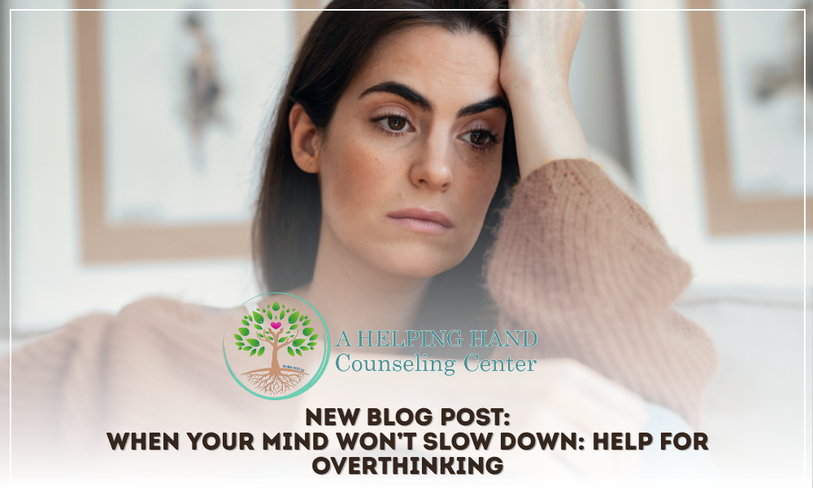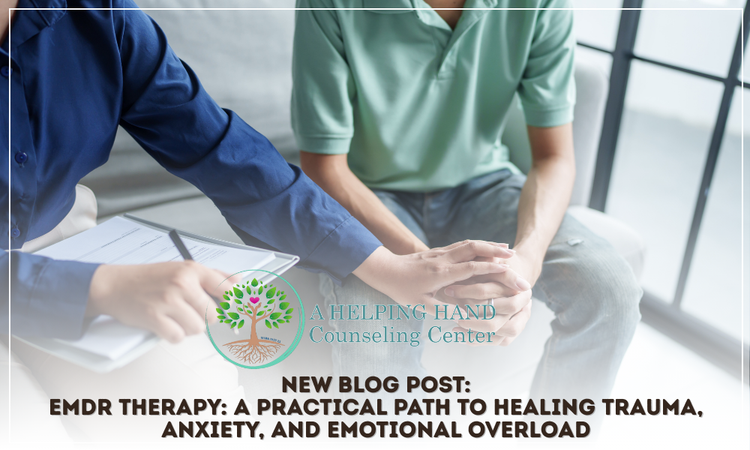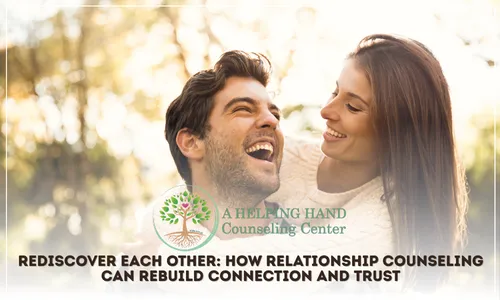
Relationship Counseling to Rebuild Trust & Connection
Struggling with disconnection, conflict, or emotional distance? Learn how relationship counseling can help couples rebuild trust, communicate better, and grow together.
Every relationship tells a story. Some stories begin with passion, ease, and shared dreams. Others are filled with quiet strength—growing slowly through the seasons of life. But even the strongest bonds can feel fragile during times of stress, change, or silence.
There comes a point in many relationships when something just feels… off. The laughter fades. The communication slows. The emotional distance grows. And yet, the love remains—buried under layers of misunderstandings, unspoken needs, or unresolved tension.
This is where couples counseling comes in—not as a fix, but as a guide. A guide back to understanding, empathy, and connection.
When Love Starts to Feel Like Work
Most couples don’t seek help after a single fight. It’s often the result of a gradual disconnect. Conversations that once felt effortless now turn into disagreements—or worse, avoidance. Physical closeness may still be there, but emotional intimacy begins to fade.
You may ask yourself:
- Why do we keep repeating the same argument?
- Why doesn’t my partner understand how I feel?
- When did we stop being a team?
- Is it possible to get back to the way things were?
The truth is, these thoughts are more common than you think. But the answer isn’t found in pretending everything’s fine. It’s found in choosing to face the discomfort together—with support.
That’s why more people are searching for couples therapy near me or marriage counseling near me—because they’re ready to heal what hurts, and rediscover what still matters.
Why Couples Seek Relationship Counseling
Contrary to popular belief, marriage therapy for couples isn’t just for relationships on the edge of collapse. Many couples turn to therapy as a proactive choice—a way to strengthen their bond before challenges escalate. It’s about building resilience and deepening emotional safety.
Here are some common reasons couples seek counseling:
- Emotional distance or feelings of growing apart
- Difficulty expressing feelings without conflict
- Rebuilding trust after betrayal or dishonesty
- Disagreements about parenting, finances, or family roles
- Differences in intimacy, affection, or expectations
- Navigating life transitions such as moving, loss, or career change
- Processing trauma, grief, or mental health struggles together
It’s not about blame—it’s about insight. About learning how your experiences, habits, and beliefs show up in your relationship and how to respond instead of react.
The Power of Feeling Seen and Heard
What makes relationship counseling transformative isn’t just the advice—it’s the space. A space where you both can speak openly, without judgment or defensiveness. A space where silence is respected, pain is honored, and small breakthroughs become big steps forward.
Through therapy, you and your partner learn to:
- Communicate without attacking or shutting down
- Name your emotional needs clearly
- Understand each other’s triggers and coping mechanisms
- Validate rather than dismiss your partner’s perspective
- Set boundaries that protect, not punish
- Rebuild trust through transparency and consistency
It’s about learning to sit with discomfort together and not let it drive you apart.
Tools That Build Resilience in Relationships
Counseling isn’t just talking—it’s learning. Therapists provide practical tools and frameworks that help you apply new insights to your everyday life.
Some key tools include:
1. Emotionally Focused Practices
Understand how emotional injuries shape reactions. Learn to identify needs beneath frustration and express them without fear.
2. Communication Techniques
From “I feel” statements to active listening, couples learn to replace blame with clarity and criticism with curiosity.
3. Rituals of Connection
Small habits—like daily check-ins or gratitude practices—can reignite emotional closeness over time.
4. Conflict De-escalation
Instead of winning arguments, couples learn how to pause, reset, and reconnect before the damage builds.
5. Relationship Agreements
Establish shared understandings around topics like trust, responsibilities, intimacy, and priorities.
These are not one-size-fits-all solutions. They’re personalized, adaptive strategies that evolve as you do.
What If Only One of You Is Willing?
This is a real concern for many. What happens when one partner is ready for counseling and the other isn’t?
Here’s what you need to know: change can begin with one person. Individual counseling can help you:
- Understand your own relationship patterns
- Learn how to communicate differently
- Respond in healthier ways, even when the dynamic feels stuck
- Sometimes, seeing one partner take intentional steps toward growth can soften the other’s resistance. But even if it doesn’t, your own clarity and emotional resilience will benefit both of you.
Let Go of the Myth of the “Perfect Relationship”
Social media and movies often give us unrealistic expectations about love. It’s easy to believe that real couples don’t fight, don’t struggle, and always know what the other needs.
The truth? Real relationships are messy. They require patience, courage, and an ongoing willingness to grow—together.
Marriage therapy for couples isn’t about being perfect. It’s about being honest. About being present. About showing up for the relationship even when it feels hard.
Common Myths About Couples Counseling—Debunked
Myths About Couples Therapy—Debunked
“Going to therapy means we’ve failed.”
Actually, it means you’re committed to growing. Seeking help is a strength, not a weakness.
“The therapist will take sides.”
A good therapist is neutral. Their focus is on the relationship—not placing blame on one partner.
“We’ll just argue more in front of someone else.”
In fact, therapists are trained to help de-escalate conversations and guide both partners into productive dialogue.
“It’s too expensive.”
Many providers offer affordable couples therapy options, including sliding scales and insurance-supported sessions.
The Relationship You Want is Within Reach
Your relationship isn’t defined by its struggles. It’s shaped by how you respond to them—together.
When couples begin therapy, they often walk in with tension and uncertainty. But over time, they start to rediscover the reasons they chose each other in the first place. They laugh again. They listen again. They lean into the hard moments and come out stronger on the other side.
Whether you’re rebuilding after a tough season or simply want to grow closer, relationship counseling can offer the space, support, and guidance to make that possible.
You Deserve to Feel Loved, Heard, and Understood
You don’t have to figure it out alone. You don’t have to settle for disconnection, silence, or the nagging feeling that something’s missing.
Relationship counseling isn’t just about healing the past—it’s about shaping a future that feels grounded, authentic, and full of possibility.
Let this be your starting point—not because you failed, but because you believe in what you can become together.
Reach out today: Call AHHC at (407) 450‑5985 or visit us at 303 Commerce Center Drive, St. Cloud, FL 34769. Secure your free initial consultation and explore sliding-scale options. Contact us today.
A Helping Hand Counseling Center
- 303 Commerce Center Drive St. Cloud, FL 34769
- teamcare@ahhcounseling.com
- (407) 450-5985
- www.ahhcounseling.com
Subscribe to Our Newsletter
Posts Category
Most Popular Posts
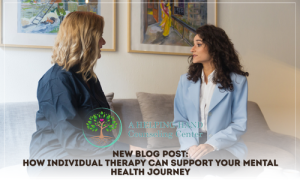
How Individual Therapy Can Support Your Mental Health Journey
Individual therapy can be a meaningful step for anyone who wants to improve emotional wellbeing and gain clarity about their thoughts and feelings. Many adults
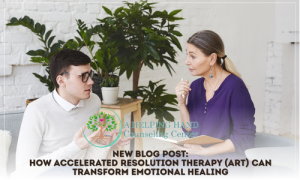
How Accelerated Resolution Therapy (ART) Can Transform Emotional Healing
Accelerated Resolution Therapy (ART) provides a powerful option for adults struggling with past traumas, stress, or PTSD, offering a more targeted and efficient approach to
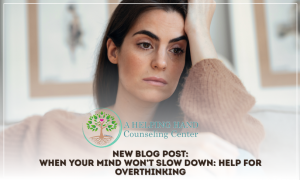
When Your Mind Won’t Slow Down: Understanding Overthinking and How to Break the Mental Loop
Overthinking doesn’t always feel like worry. Sometimes it shows up as constant planning, replaying conversations, second-guessing decisions, or feeling mentally exhausted even when nothing “big”
Subscribe to Our Newsletter




